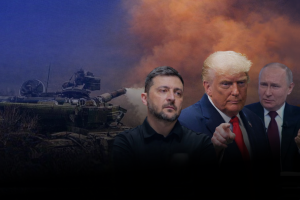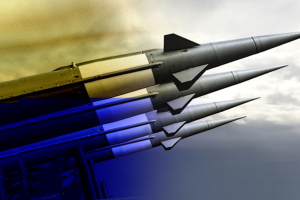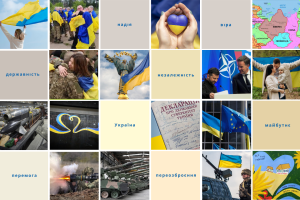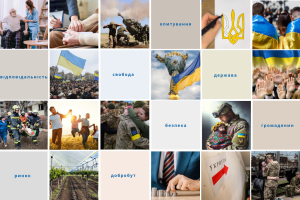The nationwide survey was conducted by the Ilko Kucheriv Democratic Initiatives Foundation in cooperation with the Razumkov Center's sociological service on August 8 to 15th 2024.
Face to face polls were conducted at Vinnytsia, Volyn, Dnipropetrovsk, Zhytomyr, Zakarpattia, Zaporizhia, Ivano-Frankivsk, Kyiv, Kirovograd, Lviv, Mykolaiv, Odesa, Poltava, Rivne, Sumy, Ternopil, Kharkiv, Kherson, Khmelnytskyi, Cherkasy, Chernihiv, Chernivtsi regions and the city of Kyiv ( in Zaporizhzhia, Mykolaiv, Kharkiv and Kherson regions - only in those territories, controlled by the government of Ukraine and in which hostilities are not taking place).
Polls were completed with stratified multistage sampling and using random selection during first stages of sampling formation and quota method of selecting respondents during closing stage (when they were selected, based on their age and gender quotas). The structure of the sample population reflects the demographic structure of the adult population of the territories that were used for this poll by the beginning of 2022 (by age, gender and type of housing).
2017 respondents were polled, age 18 and older. Theoretical sampling error isn’t higher than 2,3%. In the meantime. additional systematic correlations of the sampling could be caused by the consequences of the russian aggression in general and migration of the millions of citizens in particular.
Absolute majority of Ukrainians (88%) are proud of their citizenship. Third year in a row, the pride of one's citizenship is at an almost equally high level (2022 - 90,5%, 2023 - 88,5%, 2024 – 88%) - the highest result during sociology monitoring. Such a high level of pride is present amongst all age groups.
Regionally, the highest percentage of those, who’re proud of their citizenship, were recorded in the Western (93%), Central (87%) and Southern (87%) macroregions. Such people are slightly less represented in the Ukrainian East (84%). But in the East, the number of people who are proud of their citizenship, rose from 76% to 84% in 2022. Financial situations don’t have a significant impact on the pride of citizenship. Indeed, if amongst the poorest part of the population 86% are proud of it, then amongst the richest this number is higher, than overall in the country (94%).
If a referendum on the declaration of state independence of Ukraine was held today, the majority of Ukrainians (85%) would support independence.
For Ukrainian independence would vote both youth (85%) and the oldest generation, age 60 and older (83%) as well as both city dwellers (86%) and rural population (84,5%).
The highest number of those, who would support independence, are living in the West of our country (93%), but in the Center 87% would vote this way, in the East – 78%, in the South – 72%. Just 2% of the general population would be against, moreover, in the West there would be critically less than 1% and in the East – 4%.
Support for independence keeps its historical maximum for the last 23 years of sociological research. Only once it was even higher – 87,5% in August 2022.
In the meantime, we got less positive assumptions during the last year about the way in which Ukraine is developing: as of now, 40% of Ukrainians are thinking that things are going in the right direction (was 49% in 2023), while 37% are thinking that the chosen direction is the wrong one. Men slightly more often than women are evaluating the direction as right, but amongst the women there is more uncertainty.
Absolute majority of responders wish to build their future in Ukraine (86%) and the main bulk of them are demonstrating firm willingness to stay in Ukraine (59%). Such a wish prevails amongst the people with various levels of income and in all age groups. But with age the desire to stay in Ukraine grows. 74% of young people want to build a future in Ukraine, in the age group 30-39 years – already 81%, 40-49 – 87%, 50-59 – 90% and in the oldest group – 93%.
Around 50% of Ukrainians think that during the years of independence, as many positive things as it happened were negative. Such a tendency is common to all macroregions. At the same time, every fourth citizen (25%) thinks that positive prevailed, while for 17% – only negative.
Among the feelings that respondents have about Ukraine’s future, unequivocally prevails hope (61%), followed by anxiety (40%) and optimism (33,5%). The most regional differences are about hope. So, it’s rarely noted in Eastern macroregion (48,5%), followed by Western (56,5%) and Southern (60,5%), while Ukrainians living in Central Ukraine have the highest hopes – 71%. At the same time hopes about Ukrainian future and optimism are growing with the rise of respondent’s personal income, while anxiety, to the contrary, is more common amongst the poorest strata of population.
76% of Ukrainians are sure that russians don’t perceive Ukraine as a sovereign independent state. And these estimates are common amongst all socio-demographic groups, regardless of their age, gender, type of settlement, level of education and income.
Regionally, thought that russians don’t perceive Ukraine as a sovereign independent state, still dominates in all macroregions, but numbers slightly differentiate. This belief is most common for Center (80,5%) and in West (78%) and more rarely mentioned in the South (72%) and the East (66%), although it keeps the absolute majority there too.
Most of Ukrainians (69%) are sure that during the time of full russian invasion, society became more unified, but 24% think that this didn’t happen. The most of those, who don’t see more unity, live in the South (32%), East (29%) or West (26%) and the least in the Centre (18%).
Absolute majority of Ukrainians (71%) since the beginning of the full-scale invasion contributed to volunteer help for the army, temporarily displaced persons or people, who suffered because of war. 34% helped financially, 15% provided all possible physical assistance and 22% helped both physically and with money. It’s noteworthy that the share of those who helped financially is approximately the same amongst people of different ages (34-35%). On the contrary, 17% didn’t help and have no plans to do it.
Regionally, in the West is a significantly higher percentage, then on average around the country, of those, who helped with physical work (25%), while the highest percentage of those, who helped financially, was amongst citizens in the South (40) and Center (36%).
Most of those, who after the full-scale invasion provided financial assistance for the army, temporarily displaced persons and people suffering from war, still continue to donate funds. Slightly less than half (47%) of those, who’re donating from 2022, doing it in the same volumes as a year ago, when for 34% of respondents, amounts of their donations became less. At the same time, 9% of those who provided financial assistance after the invasion, now are donating more than a year ago. Only 7% of those who previously made donations, stopped to do it during the last year.
As the most common reason for the donations decreasing, most of the respondents named abating in their income and savings – 61% of those who previously were joining to provide assistance for the army, temporarily displaced persons and people suffering from war, but lately made less donations than a year ago. Second most common cause (for 35%) was corruption scandals in government organs that lowered respondent’s motivations to donate their own money, when budget costs are spending uneffectively. Every fourth citizen (26%) amongst those, who started to donate less funds, told stories about fraud, window-dressed as charity funds. 16% also noted that they started to trust less those people/organizations, for whom they made donations before.








